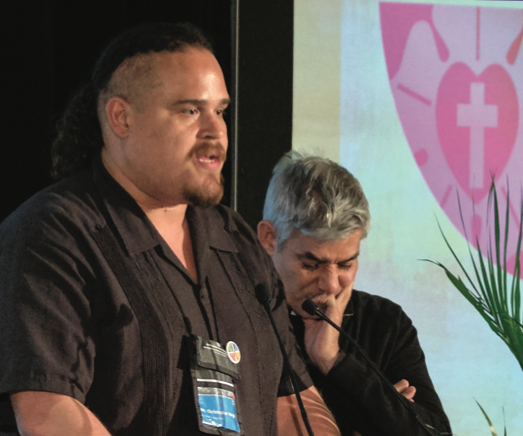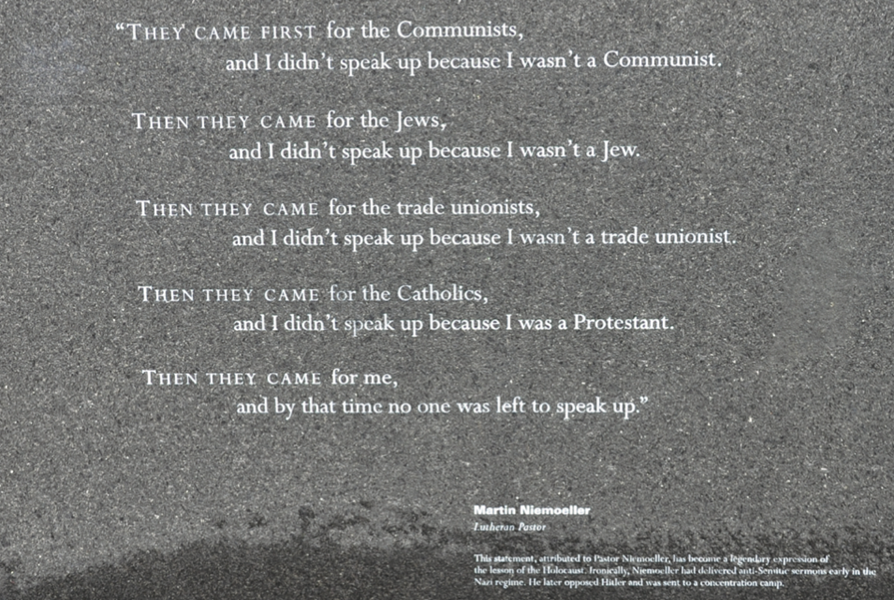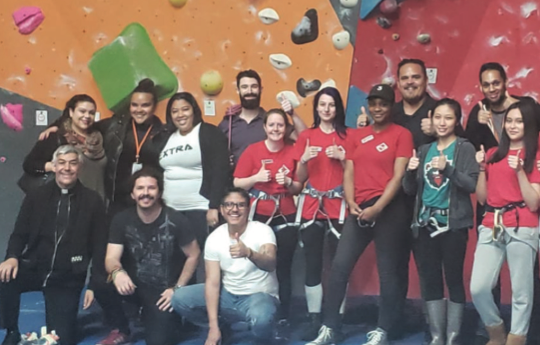“The ELCA as a Sanctuary Denomination: What Have We Done?”
Nov 20, 2019
A conversation between MNYS Vice President Renée Wicklund and MNYS Advocacy/Assistance Task Force Leader Christopher Vergara.
Christopher: So the ELCA has declared itself a sanctuary denomination. What does that mean? What is the Sanctuary Movement itself?
Renée: The idea of sanctuary dates back centuries. The Hebrew Bible tells of “cities of refuge,” which offered protection from vengeance to persons involved in accidental deaths or other tragedies. Early Christians, taking a cue from Greek and Roman law, also recognized a right of sanctuary or refuge. Later, some civil laws codified the right to take sanctuary inside a church, and prevented authorities from entering churches to remove refugees. In more modern times, when authorities began to claim the right to enter churches, some religious leaders found the need to defy those authorities. Here in the United States, churches played a prominent role in the Underground Railroad, protecting persons claimed as slaves until they could move to safer territory.
The Sanctuary Movement as we know it today rose to prominence in the 1980s with work done on behalf of refugees fleeing violence in Central America. Under the guidance of leaders across Jewish and Christian denominations, sanctuary morphed from churches as shelters to persons of faith confronting immigration policies that they felt manifested racism and intolerance. Lutherans, too, joined the Sanctuary Movement; at its 1984 general convention, the American Lutheran Church, a predecessor body to today’s ELCA, passed a resolution to “offer support and encouragement to congregations that have chosen to become refugee sanctuaries.” In 2007, a New Sanctuary Coalition formed in New York City as part of a larger New Sanctuary Movement. Among its other activities, NSC today builds interfaith coalitions, organizes safe spaces for migrants, and operates an accompaniment program, training and coordinating volunteers to attend hearings and ICE check-ins.
In becoming a sanctuary denomination, the ELCA stands with Lutherans worldwide. Right now, the Council of the Evangelical Church in Germany (EKD), a member church of the Lutheran World Federation, is working with a broad social coalition to send a ship to assist refugees crossing the Mediterranean Sea to enter Europe. Bishop Heinrich Bedford-Strohm, the chair of the EKD, said, “Christian love of the neighbor tells us not to abandon those fleeing from war and misery in their home countries and not to leave them to suffer along the way.” I feel empowered, seeing how persons of faith, in the safer nations to which refugees and migrants flee, are joining together to help.
If anyone wants to learn more about the New Sanctuary Movement, I recommend the book One Family Under God: Immigration Politics and Progressive Religion in America, written by Professor Grace Yukich—a former member of our own synod council.
Christopher: How did the ELCA become the nation’s first mainstream sanctuary denomination?
Renée: The short answer is—you (Christopher!) and the Metropolitan New York Synod made it happen.
The long answer is that the ELCA passed a memorial at the churchwide assembly, which was held August 5-10, 2019 in Milwaukee, Wisconsin. Like our annual synod assembly for MNYS, the triennial churchwide assembly serves as the highest legislative body for the ELCA. Presiding Bishop Elizabeth Eaton oversaw the churchwide assembly, with assistance from ELCA church council vice-president William Horne, ELCA secretary William (Chris) Boerger, and others. Each of the ELCA’s 65 synods nationwide sent voting members to “do the business” of the church.
During the legislative sessions of churchwide assembly, voting members bring resolutions and memorials to the floor for consideration, debate, and eventual vote. Christopher, you were the one who, speaking on behalf of our synod, brought the sanctuary memorial to the floor and first spoke in its favor. As soon as you moved to the microphone, I lined up behind you, hoping to be the second person to speak in favor. To be honest, I didn’t really hear all you said, because I was so nervous, waiting my turn at the microphone, rereading the comments I planned to present. I do remember that you had passion in your voice and spoke determinatively, like you believed we could pass the memorial, even if others had doubts.
Then we, the voting members of churchwide assembly, entered debate on the sanctuary memorial, and yes, there was a lot of debate. Most voting members who came to the microphones spoke in favor of the memorial. Those who spoke against the memorial raised concerns like whether becoming a sanctuary denomination would compel Lutherans to violate secular law; whether taking this step would put too much focus on refugees, to the detriment of serving the poor and elderly; and whether offering sanctuary meant we had to house migrants in our church buildings or even at the Offices of the Presiding Bishop in Chicago. Finally, after many voices had been heard, Presiding Bishop Eaton called for debate to conclude. Then we voted, and by a substantial margin, the ELCA became the United States’ first mainline denomination to declare itself a sanctuary church.
Of course, sanctuary is not new to MNYS or to the ELCA—it’s work that you, Christopher, have already been doing for a long time. Could you speak about the ELCA’s AMMPARO program, and how it relates to sanctuary?

Christopher: The word amparo in Spanish means the protection of a living creature from suffering or damage. The ELCA’s Accompanying Migrant Minors with Protection, Advocacy, Representation and Opportunities (AMMPARO) strategy was envisioned after witnessing the plight of children who are forced to flee their communities because of complex and interrelated reasons, including chronic violence, poverty, environmental displacement, and lack of opportunities in Central America.
As outlined in the ELCA’s memorial, sanctuary is understood to mean more than just provision of shelter. Sanctuary includes a response to raids, detentions, deportations, and criminalization of immigrants and refugees; a strategy to fight individual cases of deportation, to advocate for an end of mass detention, and to amplify immigrant voices; a vision for what communities and the world can be; and a moral imperative to take prophetic action of hospitality, rooted in the ancient traditions of our faith communities.
Presiding Bishop Eaton told us at our churchwide assembly that we, Lutherans, have a unique voice needed in the public square. Declaring ourselves a sanctuary church body is about how we talk about the work we are doing (like AMMPARO) and historically have done (like Lutheran Immigration and Refugee Services), broadening the language we use to describe that work, and using language that the world understands.
How do you understand what being a sanctuary denomination means? Does it compel Lutherans to disobey federal immigration law?
Renée: Human law exists for a reason: We need some code to agree on acceptable conduct and prevent chaos. We’ve all heard Jesus’ words in Luke 20:25: “‘Then render to Caesar the things that are Caesar’s, and to God the things that are God’s’.” In Romans 13:1-4, Paul writes, “Let every person be subject to the governing authorities. For there is no authority except from God, and those that exist have been instituted by God. Therefore, whoever resists the authorities resists what God has appointed, and those who resist will incur judgment.”
But Paul himself resisted the contemporary authorities. In Acts 16 and elsewhere, we read of civil magistrates punishing Paul and other apostles for their evangelizing. In 2 Corinthians 11, Paul refers to being flogged, beaten with rods, and jailed. And in Acts 5:29, when questioned by the high priest about their preaching activity, “Peter and the other apostles replied: ‘We must obey God rather than human beings’.”
When I put all this together, I understand that because human laws play a vital role in society, we should obey them when possible, but if necessary we must also be willing to defy unjust authority, and to suffer the consequences for doing so (as Paul suffered). When it is possible both to obey the law and to fulfill God’s commandments, that is the best course. Being part of a sanctuary denomination does not require Lutherans to defy human law in order to obey scripture. That day in August at the Wisconsin Center, when Presiding Bishop Eaton called on me to speak in favor of passing the memorial, part of what I said was that sanctuary can be a gospel issue, not a political one:
Extending sanctuary is not about immigration policy, whatever are your views on that topic. Sanctuary is about answering the call of Matthew 25: Lord, when did I see you a stranger and not invite you in, or see you naked and not clothe you? Sanctuary is not about immigration, but about immigrants, and about serving, as we are called upon to serve, those who are already among us.
As Lutherans, we know that no matter who you are, or where you came from, or what brought you to this place, you are welcome at the Lord’s table. Sanctuary is the assurance that, strangers, while you are among us, we will defend your right to share in this bounty, for it was given to you not by us, but by grace.
For me, it’s that simple. Refugees and other migrants are among us already. As long as the world remains a conflicted place, humans will continue to migrate. We have a choice to make: We can work to ensure that those who undertake the perilous journey are treated with dignity and respect, or we can say that because of the circumstances that led them to migration, they also lost their humanity. On its website, the ELCA states, “In its simplest form, becoming a sanctuary denomination means that the ELCA is publicly declaring that walking alongside immigrants and refugees is a matter of faith.”
So, what should our response be to the call for Sanctuary? I would encourage individuals, and their congregations, to look within their hearts and to the Holy Spirit to decide. I know there is sacred work in progress already, across our synod, like peaceful participation in the New Sanctuary Coalition’s Jericho Walk, where leaders from many faiths pray in solidarity with detained migrants and their families. Could you talk about other responses to the sanctuary call that are happening within our synod?

Christopher: The synod council has established a synodical Sanctuary/AMMPARO Ministry that is working to provide regular ministry of Word and Sacrament, and pastoral care, to minors in immigration detention centers on our synod’s territory; to lead members of this synod in the weekly Jericho Walk around Federal Plaza; to create a Sanctuary Youth Group that coordinates monthly recreational, cultural, educational, and artistic outings for minors in detention; to generate a list of resources availabilities for migrant minors released from custody; to coordinate with the ELCA AMMPARO network; and to recommend and coordinate opportunities for the bishop’s office to engage in immigration-related advocacy.
Renée: How can members of our synod become more involved if they wish to?
Christopher: They can ask their congregation or ministry sites to consider becoming sanctuary or AMMPARO-welcoming sites. For resources about becoming an AMMPARO-welcoming congregation, they can click on https://www.elca.org/ammparo; AMMPARO has team members available to help discern that kind of call.
They can participate in the weekly Jericho Walk, alone or with a group; details about that are also available on the AMMPARO website link, or by an information request. Over the summer, members of Pinecrest participated in Jericho Walks around Federal Plaza, and a number of deans have led their conferences in joining the walks.
Individual congregations have partnered with our Sanctuary/AMMPARO Ministry in exciting ways. St. Stephen’s Lutheran Church in Hicksville held a Latin Band Concert and Dance, with proceeds going to the Sanctuary Ministry Fund. Trinity Lutheran Church in Astoria hosted the Sanctuary Youth Group for lunch after our day of soccer, and then assembled and donated about 50 backpacks filled with school supplies for migrant minors in detention. St. James-St. Matthew’s Lutheran Church in South Ozone Park held our synod’s first pop-up immigration clinic.
Our ministry to migrants is made possible because of mission support dollars. Our synod established a Sanctuary Ministry Fund to help in this effort. Any donation helps accompany migrant minors with protection, advocacy, representation, and opportunity. A gift of $4,000 can cover a migrant child’s asylum application and processing. A gift of $500-$1,250 can provide for an outing of our Sanctuary Youth Group for 30-50 minors in detention. A gift of $200-$500 can provide for a welcome packet for a minor recently released from detention. A gift of $121 can provide for a monthly MetroCard for a minor recently released from detention. A gift of $75-$100 can provide for a cell phone for a child to remain in contact with family, lawyers, and case workers. As bonds to be released from detention range from $1,500 to as great as $10,000, any gift of any size will join with others to help change the life of unaccompanied migrant minor.
Renée: What makes you want to work so hard for migrants?
Christopher: As the son of immigrants, partnered to an immigrant, with an immigrant son who all have been victimized by our unjust and inhumane immigration system; as a member of a church of migrant people whose journeying goes all the way back to the exodus from Egypt to flee slavery; as a child of a God who was born in a foreign land and then had to flee government-sanctioned violence, who is regularly nourished by that God with God’s Word, which directly talks about welcoming the stranger among us more than 100 times in Holy Scripture and body, I think sanctuary is important not only because as an integral part of the fabric of this nation but also because as a direct and clear mandate from our Creator, for people of faith and people of conscience.

What is your motivation to support sanctuary?
Renée: Other than our Native siblings, American families are immigrants, some more recent than others. My mother was born in Germany, into the rubble of World War II. My husband was born in the Republic of Chile. They migrated to the United States for their own reasons, found a welcome here, and became enthusiastic American citizens. It isn’t in my heart to say that the door to life here should swing shut now that my family has entered; I need to find my own way to show newer arrivals the same hospitality that made my family American. Our common humanity means we are all in this together.
And of course, my faith (as I understand God’s will for me) commands action. The beginning of our Lord’s earthly incarnation is a story of migration in adverse circumstances. When I see men and women, pregnant woman, children, babies fleeing violence and oppression, I do see Mary and Joseph. (Matthew 1:18-25, 2:13-15; Luke 1:26-56, 2:1-20.) Being an American makes me an innkeeper of sorts. Being a native English speaker of European descent gives me extra privilege, which also means a greater responsibility to say that, for as long as Mary and Joseph need to stay, the inn has room for them, and warm meals too. You’re right—we find this notion throughout scripture, not just in Matthew 25:42-46. Exodus 22:21 reminds us that as all people have been foreigners at some time, we are not to mistreat the foreigners among us. Isaiah 58:7 tells us to provide the poor wanderer with shelter. 1 Timothy 5:10 enumerates “good deeds” that include not just washing the feet of the Lord’s people, but showing hospitality and helping those in trouble. Over and over, the Bible speaks of offering refuge.
I guess if I had to pick one verse to connect my faith to sanctuary, it would be Hebrews 13:2, which admonishes, “Do not neglect to show hospitality to strangers, for thereby some have entertained angels unawares.”
